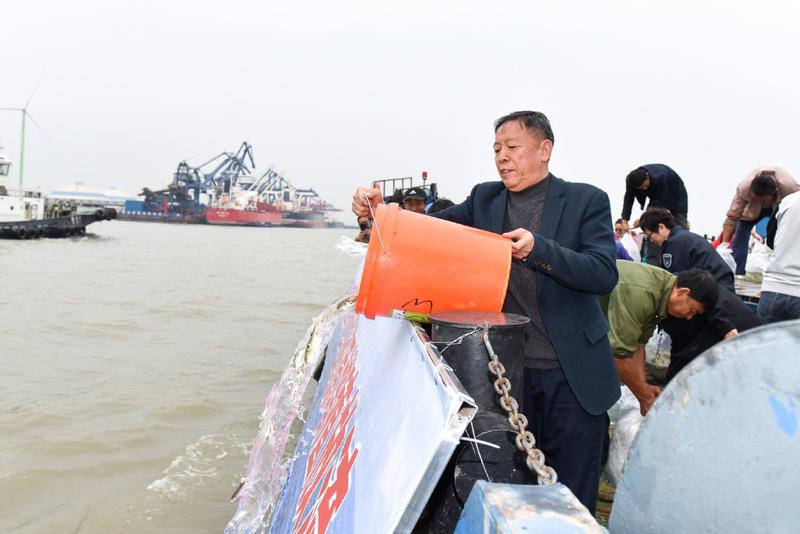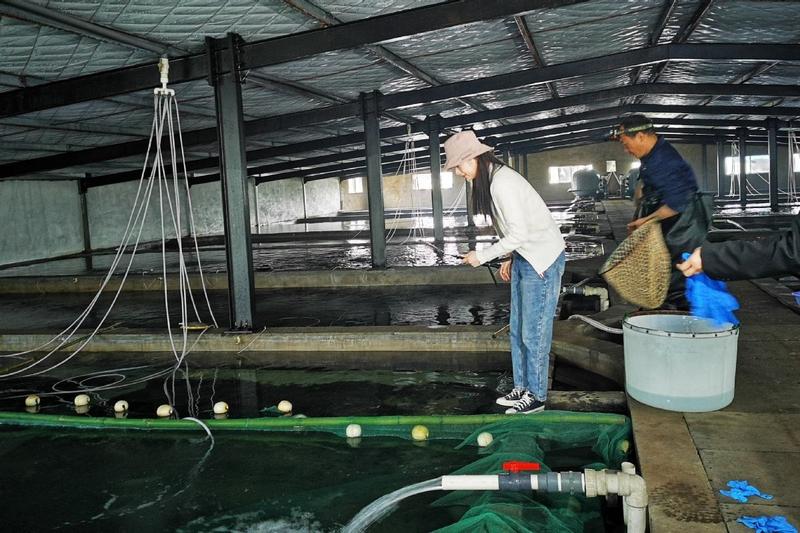 Zheng Jinliang releases small fish into the Yangtze River to replenish stocks in Jiangyin, Jiangsu province, in October. (PHOTO PROVIDED TO CHINA DAILY)
Zheng Jinliang releases small fish into the Yangtze River to replenish stocks in Jiangyin, Jiangsu province, in October. (PHOTO PROVIDED TO CHINA DAILY)
Over the past two decades, Zheng Jinliang has released more than 160 million fish into the Yangtze River in Jiangsu province at his own expense.
Now in his 60s, the former businessman has witnessed fish stocks of rare species dwindle over the past 50 years.
Degradation of the aquatic environment and overfishing caused by high demand have driven the price of the fish to more than US$1,500 a kilogram
Zheng, who has lived in the riverside city of Jiangyin his entire life, said as a result delicacies such as the Chinese tapertail anchovy-known as daoyu, or knife fish by locals-have skyrocketed in price.
Degradation of the aquatic environment and overfishing caused by high demand have driven the price of the fish to more than 10,000 yuan (US$1,500) a kilogram.
"I used to see fishermen carry baskets of fresh fish to sell when I was a little boy," Zheng said.
ALSO READ: Illegal sand mining eliminated in main stream of Yangtze River
"The knife fish were sold for 0.6 yuan a kilogram. My mother often asked me to carry a basket of vegetables to exchange for the knife fish on fishing boats."
When he was young, Zheng would hear fishermen singing as they approached the dock with large catches.
"You could tell that their songs were happy," he said. "They usually came back with boats that were full of fish and shrimp as rewards for a day's hard work.
"But they caught less and less fish, and eventually many varieties disappeared in the Yangtze. They were not only delicacies, but also species that cannot be replenished."
Zheng said he felt sad about the situation and wondered what he could do to bring back fish stocks.
In 2000, he left his steel business to get into the aquaculture industry. He took boats along the Yangtze to find rare broodstocks, or parent fish, and in late spring he would spend 15 hours a day on the water.
For Zheng, who had only finished junior high school and had no experience in the industry, tracing broodstocks seemed to be an impossible task. But he ignored other people's criticism and stuck to his mission.
 Zheng Bingqing, Zheng Jinliang's granddaughter, conducts a livestream session on small fish hatched at the aquafarm last year. (PHOTO PROVIDED TO CHINA DAILY)
Zheng Bingqing, Zheng Jinliang's granddaughter, conducts a livestream session on small fish hatched at the aquafarm last year. (PHOTO PROVIDED TO CHINA DAILY)
Over the next 20 years, he purchased rare broodstocks, usually at high prices, from fishermen who had accidentally caught them. He also sourced rare species from overseas. Zheng conducted his own research on different methods to hatch various fish eggs, including the knife fish.
In June 2002, he released the first batch of 400,000 puffer fish into the Yangtze to help restore their stocks. "Some people said I had lost my mind pouring money into the river, but I knew I was doing the right thing," said Zheng.
Following his example, many individuals, companies and organizations have joined the volunteer efforts to replenish fish stocks. In 2007, the Jiangyin government designated June 12 as Yangtze River Fish-Release Day.
In 2008, the year he was elected a representative of the Jiangsu Provincial People's Congress, Zheng submitted proposals to ban fishing in the Yangtze to protect biodiversity.
He said he was excited to hear that a 10-year fishing ban on key areas of the country's longest river took effect in January last year. The ban extended to the entire Yangtze mainstream and key tributaries starting this year.
To publicize knowledge about rare fish in the Yangtze, Zheng has established a museum. He often patiently explains to children visiting the museum how important it is to protect the environment and restore biodiversity.
READ MORE: Crackdown on Yangtze sand mining stepped up
In October, Zheng was given Jiangsu's Most Beautiful Ecology and Environment Protector award by the Jiangsu Department of Ecology and Environment and the Wuxi Information Office.
Zheng Bingqing, his granddaughter, is a great supporter of his work. The 26-year-old has decided to carry on with Zheng's efforts to restore fish numbers.
"Like my grandfather, protecting the mother river will become my mission and career," she said. "His dream all those years ago was to witness more varieties of fish swim in the Yangtze. I won't let him down."


